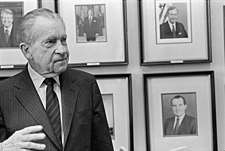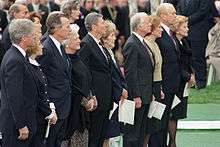Death and state funeral of Richard Nixon
On April 22, 1994, Richard Milhous Nixon, the 37th President of the United States, died after suffering a stroke four days earlier, at the age of 81. His state[1] funeral followed five days later at the Richard Nixon Presidential Library and Museum in his hometown of Yorba Linda, California. His death was the first Presidential death in 21 years, since President Lyndon B. Johnson's death in 1973.
 Richard Nixon in 1992, two years before his death | |
| Location | Richard Nixon Presidential Library and Museum, Yorba Linda, California, U.S. |
|---|---|
| Participants | Gerald Ford Jimmy Carter Ronald Reagan George H. W. Bush Bill Clinton Sir Edward Heath (former UK Prime Minister) Toshiki Kaifu (former Japanese Premier) |
Nixon suffered a cerebrovascular accident on April 18, 1994, at his home in Park Ridge, New Jersey, and was taken to New York Hospital–Cornell Medical Center.[2] After an initial favorable prognosis, Nixon slipped into a deep coma and died four days later. His body was flown to Marine Corps Air Station El Toro, Orange County, California, via SAM 27000, the presidential plane used as Air Force One while Nixon was in office.[3] His body was transported to the Nixon Library and laid in repose. A public memorial service was held on April 27, attended by world dignitaries from 85 countries and all five living Presidents of the United States, the first time that five U.S. presidents attended the funeral of another president.
Nixon's state funeral is unique among recent presidential state funerals in that, in accordance with his own wishes, none of the elements of the state ceremonies occurred in the nation's capital.[4][5]
Nixon's wife, Pat, had died ten months earlier on June 22, 1993.
Death and tributes
Nixon suffered a massive stroke at his Park Ridge, New Jersey home, while preparing to eat dinner on Monday, April 18, 1994, at 5:45 p.m. EDT.[6] An ambulance was called and he was taken to New York Hospital–Cornell Medical Center. He was conscious but unable to speak, and his vision was impaired.[7] It was determined that a blood clot resulting from his heart condition had formed in his left atrium (upper heart), then broke off and traveled to his brain. His condition was determined to be stable the following day,[2] as he was alert but unable to speak or move his right arm and leg.[6] Nixon's prognosis was hopeful, and he was moved from the intensive care unit into a private room. His condition worsened that Tuesday night, however, complicated by symptoms of cerebral edema, or swelling of the brain.[6] Nixon's living will stipulated that he was not to be placed on a ventilator to sustain his life.[6] On Thursday, Nixon sank into a coma. That Friday night, he died at 9:08 p.m., April 22, 1994.[6][7] His daughters, Tricia and Julie, were by his side.[6]
U.S. President Bill Clinton announced Nixon's death in the White House Rose Garden and proclaimed a national day of mourning five days later. Clinton stated that Nixon was "a statesman who sought to build a lasting structure of peace" and praised his "desire to give something back to this world."[6] Clinton said that he was "deeply grateful to President Nixon for his wise counsel."[6] Tributes also came from former Presidents Gerald Ford, Jimmy Carter, Ronald Reagan and George H. W. Bush.[6] Former Secretary of State Henry Kissinger, former Senator George McGovern (who ran against Nixon in 1972), former Senator Howard Baker, Senator Robert Dole, Senator John McCain and Senator Edward M. Kennedy also reflected on Nixon's death.[6]
Events in California
Transportation to the Nixon Library
Following the news of Nixon's death, tributes were placed at the Richard Nixon Presidential Library in Yorba Linda, California, the site of his birthplace.[3] On April 26, the casket was placed into VC-137C SAM 27000, a member of the presidential fleet used as Air Force One while Nixon was in office, and flown to Marine Corps Air Station El Toro, Orange County, California.[3] The body was transported in a motorcade, by hearse, to the Nixon Library.
Lying in repose

Carried by eight military pallbearers representing all branches of the United States military, Nixon's body was placed in the library lobby and lay in repose from the afternoon of Tuesday, April 26 to the afternoon of Wednesday, April 27.[3] Despite severe rain, police estimated that roughly 50,000 people waited in lines up to 18 hours to walk past the casket and pay their respects.[3]
Funeral service
The funeral service was held on Wednesday, April 27, on the grounds of the Nixon Library. The service was attended by over 4,000 people, including family members, President Bill Clinton and his wife Hillary, former Presidents and First Ladies George and Barbara Bush, Ronald and Nancy Reagan, Jimmy and Rosalynn Carter, and Gerald and Betty Ford.[3] Former Vice President Spiro Agnew also attended. A congressional delegation consisting of over one hundred members was present, and a foreign diplomatic corps of over two hundred.[3].
International guests included :



.svg.png)



In addition to that, about 15 eminent persons and 86 ambassadors was also presented.
The service was officiated by the Reverend Doctor Billy Graham, a friend of Richard Nixon's, who called him "one of the most misunderstood men, and I think he was one of the greatest men of the century."[6] Eulogies were delivered by Graham, Henry Kissinger, Senator Bob Dole, California Governor Pete Wilson and President Clinton.[3] Dole could not hold back his tears at the end of his speech,[8] a rare show of emotion in public for the Senator.
Following the service, Nixon was laid to rest beside his wife; Pat had died on June 22, 1993. They are buried only steps away from Richard Nixon's birthplace and boyhood home.
His funeral also marked the last major public appearance of former President Ronald Reagan, whose affliction with Alzheimer's disease was announced in November later that year. Ten years later, on June 5, 2004, Reagan would become the next former President after Nixon to die.[9]
References
- William Cummings (2018-12-03). "From George Washington to George H.W. Bush: The history of presidential funerals". USA Today. Retrieved 2018-12-12.
- Perez-Pena, Richard (April 19, 1994). "Nixon 'Stable' After Stroke At His Home". The New York Times. Retrieved 2008-08-14.
- "Funeral Services of President Nixon". Richard Nixon Library and Birthplace Foundation. Archived from the original on 2009-12-19. Retrieved 2008-08-14.
- William Hamilton and Christine Spolar (April 28, 1994). "Richard Nixon's Long Journey Ends". The Washington Post. Retrieved 2018-12-12.
- Elisabeth Bumiller and Elizabeth Becker (June 8, 2004). "The 40th President: The Plans; Down to the Last Detail, a Reagan Style Funeral". The New York Times. Retrieved 2018-12-12.
- Weil, Martin and Eleanor Randolph (April 23, 1994). "Richard M. Nixon, 37th President, Dies". The Washington Post. p. A01. Retrieved 2008-08-14.
- Black, Conrad (2007), p. 1051
- Bob Dole weeps at Nixon funeral on YouTube
- PBS.org excerpt from Lou Cannon biography of Reagan
Further reading
| Wikimedia Commons has media related to Death and funeral of Richard Nixon. |
- Black, Conrad (2007). Richard M. Nixon: A Life in Full. New York: Public Affairs. ISBN 978-1-58648-674-7.